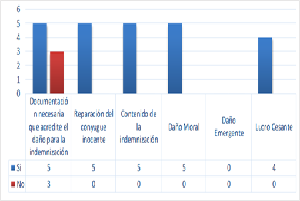Criteria applied to determine the compensation of the affected spouse in the divorce for the cause of adultery
DOI:
https://doi.org/10.51252/rcri.v2i2.358Keywords:
adultery, spouse, divorce, Specialized Family CourtAbstract
In Peru, there is jurisprudence and doctrine on compensation for adultery, as a result, it is observed whether the judges of courts use those guidelines or criteria given by the legislative sources or if they use their own criteria to issue a sentence. In this sense, the purpose of the article was to determine the criteria that the magistrate of the 1st specialized family court of Tarapoto takes into account to set the compensation of the spouse affected by the separation from the body for the cause of adultery in relation to the processes developed; the type of research was quantitative, descriptive and non-experimental, using a documentary analysis sheet as an instrument. Among the results, 62.25% of claims were declared admissible and of these claims, 100% have obtained a type of reparation/compensation for non-pecuniary damage, as well as knowing the criteria applied in court for a correct process. . It is concluded that knowing the divorce on the grounds of adultery is considered the necessary documentation that proves the damage for compensation, reparation of the innocent spouse, the most common repair being moral damage, later that of loss of earnings and consequential damage.
Downloads
References
Aguilar Llanos, B. (2018). Causales de separación y divorcio, enfoque doctrinario y jurisprudencial. Gaceta Jurídica.
Chung, J. J., & Liu, J. (2018). The abolition of the adultery law in South Korea: A critique. Asian Journal of Women’s Studies, 24(2), 205–223. https://doi.org/10.1080/12259276.2018.1464108
De Amunátegui Rodríguez, C. (2020). El deber de fidelidad entre los cónyuges: daños por incumplimiento en el tratamiento de los Tribunales españoles. Revista IUS, 14(46). https://doi.org/10.35487/RIUS.V14I46.2020.511
Harris, C. (2018). Characteristics of Emotional and Physical Marital Infidelity That Predict Divorce. ProQuest. https://www.proquest.com/openview/33c42af0a02462c73ff45d4133cffae5/1.pdf?pq-origsite=gscholar&cbl=18750
Haseli, A., Shariati, M., Nazari, A. M., Keramat, A., & Emamian, M. H. (2019). Infidelity and Its Associated Factors: A Systematic Review. The Journal of Sexual Medicine, 16(8), 1155–1169. https://doi.org/10.1016/J.JSXM.2019.04.011
Hernández Sampieri, R., Fernández Collado, C., & Baptista Lucio, P. (2014). Metodología de la investigación (McGraw-Hill Education (ed.); Sexta Edic).
Thapa, R., Yang, Y., & Chan, S. (2019). Young rural women’s perceptions of sexual infidelity among men in Cambodia. Culture, Health & Sexuality, 22(4), 474–487. https://doi.org/10.1080/13691058.2019.1608469
Turner Saelzer, S. (2018). Infidelidad, culpa, divorcio e indemnización de perjuicios en el derecho matrimonial argentino y chileno. Revista de Derecho Privado, 35(35), 105–128. https://doi.org/10.18601/01234366.N35.05
Urbina Rodríguez, S. J., & Zapata Denis, M. M. (2020). La procedencia en México de la responsabilidad civil por el incumplimiento de deberes entre cónyuges. Revista IUS, 14(46). https://doi.org/10.35487/RIUS.V14I46.2020.536
Vargas Morales, R. A. (2020). Diversas posturas con respecto a la admisibilidad o inadmisibilidad de la indemnización de perjuicios en caso de incumplimientos a los deberes matrimoniales en el derecho chileno. Revista de La Facultad de Derecho, 49, e2020n49a4. https://doi.org/10.22187/RFD2020N49A4
Vial-Dumas, M. (2019). Pagar la culpa: matrimonio, divorcio y responsabilidad en la tradición jurídica occidental. Revista de Derecho Privado, 37, 31–55. https://doi.org/10.18601/01234366.N37.03
Yuan, S., & Weiser, D. A. (2019). Relationship dissolution following marital infidelity: comparing European Americans and Asian Americans. Marriage & Family Review, 55(7), 631–650. https://doi.org/10.1080/01494929.2019.1589614

Published
How to Cite
Issue
Section
License
Copyright (c) 2022 Cristina Davila-Uribe, Grethel Silva-Huamantumba

This work is licensed under a Creative Commons Attribution 4.0 International License.
The authors retain their rights:
a. The authors retain their trademark and patent rights, as well as any process or procedure described in the article.
b. The authors retain the right to share, copy, distribute, execute and publicly communicate the article published in the Ratio Iure Scientific Journal (RCRI) (for example, place it in an institutional repository or publish it in a book), with an acknowledgment of its initial publication in the RCRI.
c. Authors retain the right to make a subsequent publication of their work, to use the article or any part of it (for example: a compilation of their works, notes for conferences, thesis, or for a book), provided that they indicate the source of publication (authors of the work, journal, volume, number and date).






